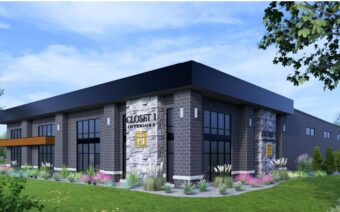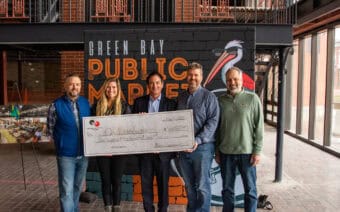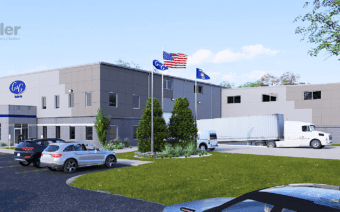
November 4, 2024
KAUKAUNA – Because of its growth over the years and to help meet its customers’ needs, Dylan Milis, CEO of Kaukauna-based Milis Flatwork – a concrete contractor specializing in flatwork, foundations and tilt-up work – said the company recently underwent an expansion to increase its manufacturing/office space.
“We built our original shop and small office in 2016, I believe,” he said. “Basically, we outgrew our old office and shop, so we built a standalone, 10,000-square-foot office and built another 18,000- to 20,000-square-foot shop, with another 18,000 square feet of space (under) construction right now. That has an expected completion date by spring 2025.”
Dylan said the expansion has helped with “simply having more room.”
“With our two shops we’re adding on – the one that is already built and the other one that is still in the construction phase – it’s just so we can better optimize the different divisions of our company,” he said. “Now we can keep our heavy equipment and our expensive equipment inside. With our different divisions, it allows us to keep everybody organized in a specific area.”
More than meets the eye
There’s more to concrete work than just pouring it and letting Mother Nature take care of the rest.
Dylan said the work also requires planning, dealing with the weather and making sure the job is “taken to the finish line.”
“Concrete is not that simple,” he said. “Concrete can be poured in almost any condition, but between 50-80 degrees is what we call optimal conditions. When you are in optimal conditions, you don’t have to change a lot of things.”
That is, Dylan said, until you get above or below optimal weather conditions.
“When it’s cold, you have to start adding chemicals and hot water and/or heated materials and then you have blanketing, heat coils and all those other things – you’re just throwing more money at it the colder it gets,” he said. “But, if you have to get your project done, you might have to take extreme measures.”

Dylan said Milis (located at W4567 County Highway KK) has poured projects in negative 12-degree temperatures.
“Despite the cold weather, we’ve had tremendous success,” he said. “A lot of labor and hard work with small pour sizes and project management really goes into making it successful.”
Once you get into the higher temperatures, Dylan said, “it’s more about being strategic with your pour time.”
“That would mean pouring early in the morning or pouring at night,” he said. “You can also add chemicals, ice and things like that to cool the concrete down.”
Dylan said depending on the application, there are concrete buildings out there between 90-100 years old – “concrete can last a long time.”
A specialty concrete contractor
With multiple concrete contractors in Northeast Wisconsin, Dylan said it’s important to stand out in what you offer.
He said that’s why Milis is known for its tilt-up work – a building technique for casting concrete elements in a horizontal position at a job site and then tilting them to their final position, typically with a crane.
“We’ve been doing tilt-up (work) for a long time,” he said. “We are the first ones to do it in the State of Wisconsin, and we’re the only ones to do it successfully in the state. Other people have tried and failed.”
Dylan said tilt-up work can reduce costs as all labor is done on-site.
“If you’re constructing a building out of concrete, you cast the panels on-site on a floor,” he said. “Then you bring a crane in and tilt (the panels) up and set them. When you’re doing it, you don’t have to truck (the panels) down the road and worry about weight limits (on the roads) for the trucks. Some of the panels we are tilting up on-site weigh a quarter of a million (250,000) pounds, and they’re 36 feet wide and 65 feet tall.”
Watching tilt-up work in action, Dylan said, is “quite the sight.”
“Most people don’t have the opportunity to see a monster Manitowoc crane weighing 400 tons picking up a 250,000-pound panel,” he said.
The amount of concrete used for some jobs, Dylan said, “is tremendous.”
“We’ve had concrete projects that have taken up to 88,000 yards of concrete,” he said. “We once did a two-million-square-foot project.”
Besides specializing in tilt-up work, Dylan said Milis does a variety of other things – “we like to say, ‘our reputation is concrete.’”
“We usually do bigger concrete jobs,” he said. “We do a lot of stuff for municipalities, including work for fire departments, etc. We just finished up the Germantown Department of Public Works facility – it was a massive concrete job. We did all the interior concrete work and all the exterior parking lot with concrete.”

Dylan said Milis doesn’t work too much in the residential side of concrete work.
“We are better equipped for bigger industrial concrete work,” he said. “We typically don’t do much residential unless it’s very high-end or for a customer who we’re doing some commercial/industrial work for. We’re not actively pursuing the residential market – there are plenty of other things outside of that for us to do. We wouldn’t be super-efficient on most residential work unless it’s something like a long driveway where it would take a substantial amount of labor to do it.”
Dylan said Milis doesn’t just pour the concrete, it also does design work.
“Obviously, we do all of our own permitting and drawings now that we’ve grown over the years,” he said. “We have an in-house engineer who does all that stuff now because I don’t have the time to do it anymore.”
Dylan said Milis pours a lot of parking lots, too.
“We do all of our own designs for parking lots and full-scale parking lot rehabilitation projects,” he said. “Customers will get their entire parking lot redone… we’ll come in, redesign the whole thing and take core samples, whatever we need to do to find out how much rehabilitation their site needs. After we get all the permits, we’ll come in and handle the whole project with subcontractors and our self-perform work.”
Currently, Dylan said Milis has about 200 employees.
Concrete in his blood
Dylan, who said he grew up pouring concrete, attended the University of Wisconsin-Platteville where he received a civil engineering degree, with an emphasis on construction and transportation.
During college, he said he worked for the City of Appleton.
“I worked for Appleton as an engineering aid, doing survey work and DOT inspections,” he said. “After graduating, I got an engineering job and was doing on-site project management, some design stuff, etc.”
Working at the engineering firm, Dylan said, eventually gave him the idea of starting his own business.
“I got the concept of getting the business started when my boss needed some concrete work done, and because I had a background in it – it was on my resume – that gave me the motivation,” he said. “I saw a need for (quality concrete work) and went for it (in 2012). There were also a lot of times the concrete guy wasn’t showing up on time. I also saw quality issues. I saw those things, and I was like, ‘Well, I know I can do it better, and I know I can show up on time.’”
For more information on Milis Flatwork, visit milisflatwork.com.
 Business support is critical to alleviating blood shortages
Business support is critical to alleviating blood shortages Strong-rooted La Crosse business named finalist for manufacturing award
Strong-rooted La Crosse business named finalist for manufacturing award








